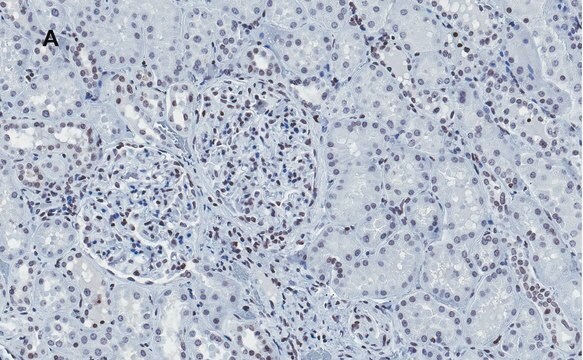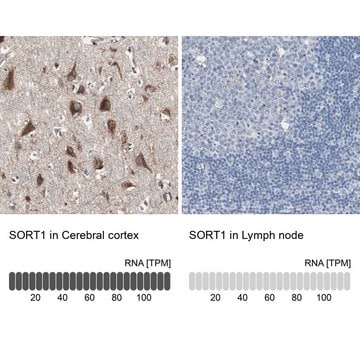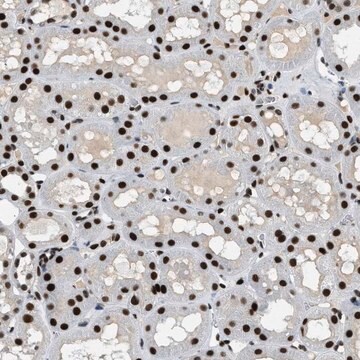ZMS1071
Anti-pan Ago Antibody, clone 2A8 ZooMAb® Mouse Monoclonal

recombinant, expressed in HEK 293 cells
About This Item
Produits recommandés
Source biologique
mouse
Niveau de qualité
Produit recombinant
expressed in HEK 293 cells
Conjugué
unconjugated
Forme d'anticorps
purified antibody
Type de produit anticorps
primary antibodies
Clone
2A8, recombinant monoclonal
monoclonal
Gamme de produits
ZooMAb® learn more
Forme
lyophilized
Poids mol.
calculated mol wt ~97.21 and 93.62 kDa
observed mol wt ~95 and 70 kDa
Espèces réactives
human
Conditionnement
antibody small pack of 25 μL
Caractéristiques du produit alternatif plus écologique
Waste Prevention
Designing Safer Chemicals
Design for Energy Efficiency
Learn more about the Principles of Green Chemistry.
Validation améliorée
recombinant expression
Learn more about Antibody Enhanced Validation
sustainability
Greener Alternative Product
Technique(s)
flow cytometry: suitable
immunocytochemistry: suitable
immunohistochemistry (formalin-fixed, paraffin-embedded sections): suitable
immunoprecipitation (IP): suitable
western blot: suitable
Isotype
IgG1κ
Numéro d'accès UniProt
Autre catégorie plus écologique
, Aligned
Conditions d'expédition
ambient
Température de stockage
2-8°C
Modification post-traductionnelle de la cible
unmodified
Description générale
Each ZooMAb antibody is manufactured using our proprietary recombinant expression system, purified to homogeneity, and precisely dispensed to produce robust and highly reproducible lot-to-lot consistency. Only top-performing clones are released for use by researchers. Each antibody is validated for high specificity and affinity across multiple applications, including its most commonly used application. ZooMAb antibodies are reliably available and ready to ship when you need them.
Spécificité
Immunogène
Application
Evaluated by Western Blotting in HeLa cell lysate.
Western Blotting Analysis: A 1:1,000 dilution of this antibody detected pan Ago in HeLa cell lysate.
Tested Applications
Western Blotting Analysis: A 1:1,000 dilution from a representative lot detected pan Ago in MCF-7 cell lysate.
Immunohistochemistry (Paraffin) Analysis: A 1:100 dilution from a representative lot detected pan Ago in human kidney tissue sections.
Immunocytochemistry Analysis: A 1:100 dilution from a representative lot detected pan Ago in MCF-7 cells.
Flow Cytometry Analysis: 1 μg from a representative lot detected pan Ago in one million MCF-7 cells.
Immunoprecipitation Analysis: A representative lot immunoprecipitated Ago protein in Immunoprecipitation applications (Nelson, P.T., et. al. (2007). RNA. 13(10):1787-92).
Note: Actual optimal working dilutions must be determined by end user as specimens, and experimental conditions may vary with the end user
Description de la cible
Forme physique
Reconstitution
Stockage et stabilité
Informations légales
Clause de non-responsabilité
Vous ne trouvez pas le bon produit ?
Essayez notre Outil de sélection de produits.
Code de la classe de stockage
11 - Combustible Solids
Classe de danger pour l'eau (WGK)
WGK 1
Point d'éclair (°F)
Not applicable
Point d'éclair (°C)
Not applicable
Certificats d'analyse (COA)
Recherchez un Certificats d'analyse (COA) en saisissant le numéro de lot du produit. Les numéros de lot figurent sur l'étiquette du produit après les mots "Lot" ou "Batch".
Déjà en possession de ce produit ?
Retrouvez la documentation relative aux produits que vous avez récemment achetés dans la Bibliothèque de documents.
Notre équipe de scientifiques dispose d'une expérience dans tous les secteurs de la recherche, notamment en sciences de la vie, science des matériaux, synthèse chimique, chromatographie, analyse et dans de nombreux autres domaines..
Contacter notre Service technique








